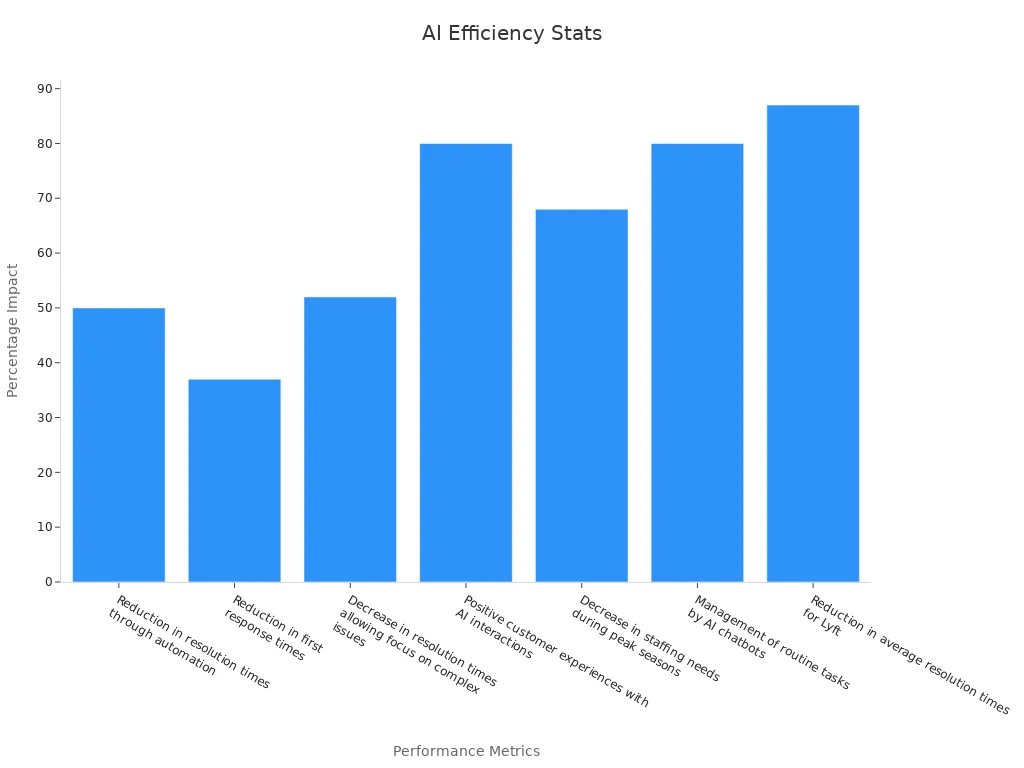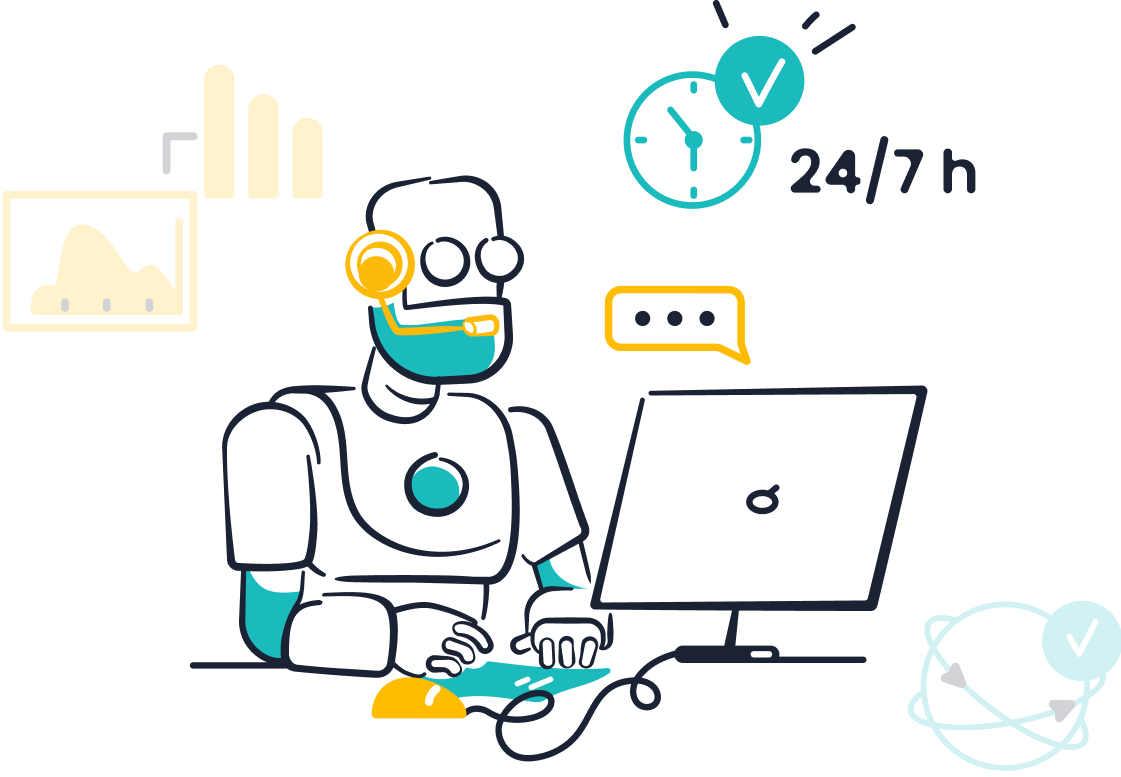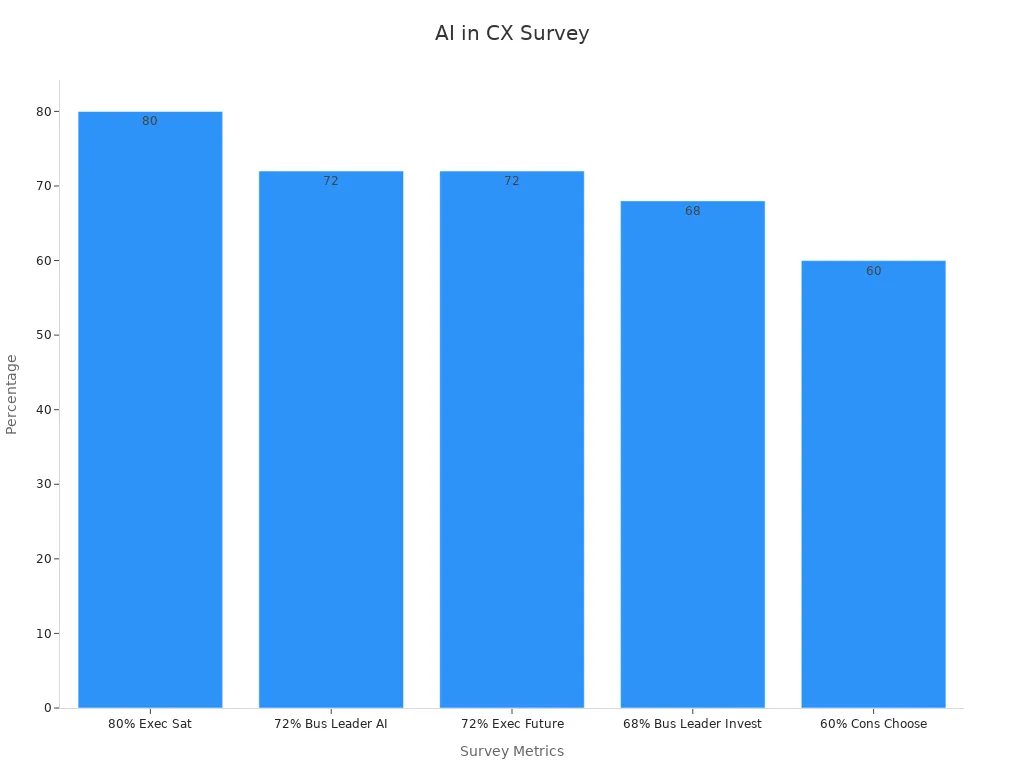The Ultimate Review of AI Customer Support Tools in 2025

The way businesses handle customer support has changed dramatically in 2025, thanks to AI. Companies now rely on AI-driven customer support tools to meet rising consumer expectations and streamline operations. These tools are not just helpful; they are essential. For instance, 73% of customers believe AI improves service quality, and 84% of service reps say AI makes responding to tickets easier. Businesses are also embracing AI at an unprecedented pace, with over 90% investing in some form of artificial intelligence. Tools like Sobot’s AI solutions provide seamless, efficient, and personalized support, ensuring you stay ahead in a competitive market.
What Are AI-Driven Customer Support Tools?
Definition and key capabilities of AI customer support software
AI-driven customer support tools are advanced software solutions that use artificial intelligence to enhance the way businesses interact with their customers. These tools automate repetitive tasks, provide instant responses, and improve the overall efficiency of customer service operations. They rely on technologies like natural language processing (NLP), machine learning, and data analytics to deliver personalized and accurate support.
Here are some key capabilities of AI customer support software:
- AI Chatbots: These bots handle common inquiries, offering instant responses to customers.
- Natural Language Processing (NLP): This feature allows the software to understand and interpret customer queries accurately.
- Automated Ticketing: AI tools can create and assign support tickets automatically based on customer interactions.
- Multi-Channel Support: They integrate with platforms like social media, email, and mobile apps to provide seamless communication.
- 24/7 Availability: AI tools ensure round-the-clock support, so customers can get help anytime.
- Analytics and Insights: These tools analyze customer interactions to provide actionable insights for improving service quality.
| Key Feature | Description |
|---|---|
| AI Chatbots | Automated bots that handle common inquiries and provide instant responses. |
| Natural Language Processing (NLP) | Enables the tool to understand and interpret customer queries accurately. |
| Automated Ticketing | Automatically creates and assigns support tickets based on customer interactions. |
| Multi-Channel Support | Integrates with various communication channels like websites, mobile apps, social media, and email. |
| Personalized Interactions | Tailors responses and recommendations based on customer data and behavior. |
How AI tools differ from traditional customer support solutions
AI tools revolutionize customer support by offering scalability, consistency, and cost-efficiency that traditional methods cannot match. Unlike human agents, AI-driven customer support tools can handle unlimited simultaneous interactions, ensuring faster response times and 24/7 availability. They also deliver consistent responses, unaffected by mood or experience, and reduce operational costs by automating repetitive tasks.
| Feature | AI Chatbots | Traditional Customer Support |
|---|---|---|
| Scalability | Can handle unlimited simultaneous interactions | Limited by the number of human agents |
| Availability | 24/7 service | Restricted to business hours |
| Consistency | Delivers uniform responses | Varies by agent experience and mood |
| Cost | One-time setup, low operational costs | High ongoing costs (salaries, training) |
| Customer Experience | Personalization through data-driven responses | Human touch, empathy, and adaptability |
Common applications of AI in customer service, including chatbots, sentiment analysis, and ticket routing
AI-driven customer support tools have transformed the way businesses address customer needs. Chatbots are one of the most common applications, capable of handling numerous queries simultaneously and providing instant responses. For example, Spotify uses its "Spotify Assistant" chatbot to recommend music and troubleshoot issues. Similarly, H&M employs AI chatbots to offer personalized style advice.
Sentiment analysis is another powerful application. AI tools analyze customer emotions through text or speech to identify dissatisfaction and address concerns promptly. For instance, Hootsuite uses AI-powered sentiment analysis to monitor social media channels, enabling businesses to respond to negative feedback in real time.
AI also excels in ticket routing. By automating the prioritization and assignment of tickets, these tools reduce response times and ensure efficient issue resolution. Zendesk, for example, uses AI to categorize and route customer requests, improving service efficiency.
Tip: Businesses using AI tools like chatbots and sentiment analysis can reduce response times by 25% and increase issue resolution rates by 30%.
Benefits of Using AI in Customer Support

Enhanced efficiency and faster response times
AI transforms customer support by automating repetitive tasks and providing instant solutions. This automation reduces response times significantly, allowing your team to focus on complex issues. For example, AI chatbots can handle up to 80% of routine inquiries, ensuring faster resolutions without involving human agents. Companies like Lyft have reported an 87% reduction in average resolution times by integrating AI tools into their operations.
AI insights also play a crucial role in optimizing workflows. By analyzing customer interactions, AI identifies areas for improvement, helping you streamline processes and enhance productivity. According to Sobot, businesses using AI for customer service experience up to a 50% reduction in resolution times, enabling them to deliver exceptional service even during peak periods.
Did you know? AI-powered automation can decrease staffing needs by up to 68% during high-demand seasons, making it a cost-effective solution for scaling operations.
Improved personalization and customer satisfaction
AI excels at delivering personalized interactions by analyzing customer data and preferences. This personalization ensures every customer feels valued, leading to higher satisfaction rates. For instance, AI tools can recommend products or services based on past behaviors, creating a tailored experience for each user.
Websites and apps now adapt their content in real-time, thanks to AI insights. This approach not only enhances customer experience but also fosters loyalty. Over 90% of businesses are exploring AI to improve personalization, recognizing its potential to boost engagement and sales. Sobot’s AI chatbot, for example, uses smart self-service and proactive messaging to increase conversion rates by 20%, while maintaining a high standard of customer satisfaction.
Tip: Personalized interactions reduce churn rates and encourage repeat business, helping you build stronger relationships with your customers.
Scalability for businesses of all sizes
AI in customer support offers unmatched scalability, making it ideal for businesses of any size. Whether you’re a startup or a global enterprise, AI tools can handle large volumes of inquiries simultaneously. This capability ensures consistent service quality, even as your customer base grows.
Regular optimization of AI models ensures they adapt to increasing data volumes and evolving business needs. Sobot’s omnichannel solution, for instance, integrates AI-driven automation to manage customer interactions across multiple platforms. This unified approach not only improves efficiency but also enhances customer satisfaction by providing seamless support.

By leveraging AI, you can scale your operations without compromising on quality, ensuring your customers always receive the support they need.
Cost savings and resource optimization.
AI-powered customer support software offers significant cost savings and resource optimization for businesses. By automating repetitive tasks, AI reduces the need for large support teams. This allows you to allocate resources more effectively. For example, AI chatbots can handle up to 80% of routine inquiries, which minimizes the workload for human agents. This not only saves money but also ensures your team focuses on complex customer issues.
AI tools also optimize operational costs through advanced strategies. Many cloud platforms provide committed-use discounts, helping you save on long-term AI implementations. Additionally, AI uses data compression techniques to reduce storage costs for training datasets. These methods ensure you maximize your return on investment while keeping expenses under control.
| Evidence Description | Key Insights |
|---|---|
| AI Cost Optimization Strategies | Organizations face challenges in achieving high ROI without effective cost optimization strategies. |
| Committed-Use Discounts | Cloud platforms offer discounts for long-term commitments, optimizing costs for AI implementations. |
| Data Compression Techniques | Utilizing lossless and lossy data compression can significantly reduce storage costs for AI training datasets. |
| AI-Powered Cost Allocation | AI agents enhance financial management by improving efficiency, strategic decision-making, and resource allocation. |
AI-driven customer support software also improves resource allocation. These tools analyze customer interactions to identify patterns and predict demand. This helps you prepare for peak periods without overstaffing. For instance, Sobot’s AI solutions enable businesses to reduce staffing needs by up to 68% during high-demand seasons. This ensures you maintain high service quality while cutting unnecessary expenses.
By leveraging AI, you can achieve a balance between cost efficiency and exceptional customer support. These tools not only save money but also enhance productivity, making them a valuable investment for businesses of all sizes.
Top AI Customer Support Tools in 2025

Sobot Chatbot - Features, benefits, and ideal use cases

Sobot Chatbot stands out as one of the most advanced AI-powered chatbots in 2025. It offers businesses a comprehensive solution for automating customer interactions. With features like omnichannel support, multilingual capabilities, and a no-coding-required setup, this chatbot simplifies customer service operations. Its AI-powered live chat integrates seamlessly with platforms like WhatsApp and SMS, ensuring customers receive support through their preferred channels.
The benefits of Sobot Chatbot are remarkable. It enhances efficiency by solving routine queries autonomously, improving productivity by up to 70%. It also reduces costs by triaging inquiries 24/7, saving businesses up to 50% on staffing expenses. Additionally, its smart self-service and proactive messaging boost conversion rates by 20%. For example, companies using Sobot have reported a 96% positive feedback rate and a 35% increase in sign-off rates.
Ideal use cases include retail, gaming, and financial services. In retail, Sobot Chatbot helps customers find products quickly. In gaming, it resolves player issues efficiently. In financial services, it guides customers through complex inquiries. Businesses of all sizes can leverage this software to improve customer satisfaction and operational efficiency.
Tip: Sobot Chatbot’s customizable workflows make it easy to tailor solutions to your business needs. Learn more about its features here.
Freshdesk - Features, pros, cons, and use cases
Freshdesk is a popular AI customer support software known for its feature-rich platform. It offers effective ticket management, omnichannel support, and AI-driven automation. These features make it a scalable solution for small and medium-sized businesses. Freshdesk integrates with various tools, enabling seamless workflows and improved customer interactions.
| Pros | Cons |
|---|---|
| Feature-rich platform | Limited advanced features |
| Effective ticket management | Occasional system glitches |
| Scalability for small and medium businesses | Pricing concerns |
| Omnichannel support | Advanced customization challenges |
| AI-driven automation | Limited offline support |
Freshdesk excels in ticket management, helping businesses prioritize and resolve issues efficiently. However, its pricing and occasional system glitches may pose challenges for some users. Use cases include e-commerce and education, where businesses need scalable solutions to manage high volumes of customer inquiries.
Zendesk AI - Features, pros, cons, and use cases
Zendesk AI transforms customer support with its advanced automation and integration capabilities. It uses generative AI to deliver personalized customer interactions and intelligent routing for efficient ticket management. Zendesk also provides proactive support mechanisms, enhancing customer experience.
| Features | Benefits |
|---|---|
| Generative AI for personalization | Higher customer satisfaction rates |
| Intelligent routing | Faster ticket resolution |
| Proactive support mechanisms | Improved customer loyalty |
Zendesk AI enhances agent productivity by streamlining workflows. It integrates seamlessly with other tools, making it a versatile choice for businesses. Use cases include enterprise services and manufacturing, where complex customer inquiries require efficient management.
Note: Zendesk AI’s proactive features help businesses anticipate customer needs, ensuring a superior support experience.
HappyFox AI - Features, pros, cons, and use cases.
HappyFox AI is a robust AI customer support software designed to streamline ticket management and enhance customer satisfaction. It automates repetitive tasks, enabling your team to focus on complex issues. With features like sentiment analysis and predictive issue resolution, HappyFox AI ensures faster and more accurate responses.
Features:
- Automated Ticket Categorization & Routing: HappyFox AI categorizes and routes tickets based on urgency, ensuring quick handling by the right personnel.
- Sentiment Analysis: It evaluates the tone of customer messages, prioritizing sensitive issues for immediate attention.
- Instant Responses: The software provides instant answers to common queries, reducing wait times.
- Predictive Issue Resolution: It predicts and resolves issues before they escalate, such as password resets or system updates.
Pros:
- Improves ticket resolution speed and accuracy.
- Enhances customer satisfaction with personalized interactions.
- Reduces agent workload through automation.
Cons:
- Limited customization options for smaller businesses.
- Requires initial training to optimize AI performance.
Use Cases:
HappyFox AI is ideal for industries like retail and education. In retail, it helps manage high volumes of inquiries during peak seasons. In education, it assists in resolving student queries efficiently. With a customer satisfaction score of 4.6, HappyFox AI stands out as a reliable choice for businesses seeking efficient AI tools for customer support.
Did you know? AI-driven ticket resolution reduces delays and errors compared to traditional methods, ensuring a smoother customer experience.
Salesforce Einstein - Features, pros, cons, and use cases.
Salesforce Einstein is a powerful AI customer support software that integrates seamlessly with the Salesforce ecosystem. It enhances productivity and efficiency by automating routine tasks and providing actionable insights.
Features:
- AI-Generated Case Replies: Einstein drafts responses for agents, achieving an 80% close rate.
- Predictive Analytics: It forecasts customer needs, enabling proactive support.
- Chat Abandonment Reduction: The software decreases chat abandonment rates by 70%, ensuring better engagement.
Pros:
- Boosts agent productivity with AI-generated responses.
- Reduces case resolution times significantly.
- Enhances customer loyalty through proactive support.
Cons:
- Best suited for businesses already using Salesforce.
- May require additional investment for full integration.
Use Cases:
Salesforce Einstein is perfect for large enterprises and financial services. It helps financial institutions predict customer needs and resolve issues proactively. With 85% of agents finding its AI responses helpful, Einstein proves to be a valuable asset for improving customer support efficiency.
Tip: Use Salesforce Einstein to reduce repeat calls by 8% and improve overall customer satisfaction.
How to Choose the Right AI Customer Support Software
Assessing your business needs and customer experience goals
Choosing the right AI customer support software starts with understanding your business challenges and goals. Define the specific problems you want to solve. For example, do you need faster response times or better personalization? Identify the outcomes you aim to achieve, such as higher customer satisfaction or reduced operational costs.
Evaluate how the software aligns with your customer experience objectives. Consider metrics like response time, resolution rate, and satisfaction scores to measure success. Integration capabilities with your existing systems are also crucial. Ensure the software can scale as your business grows. For instance, Sobot’s omnichannel solution adapts to increasing data volumes, making it ideal for businesses of all sizes.
Tip: Conduct a cost and ROI analysis to ensure the software delivers value while meeting your goals.
Evaluating features, integrations, and scalability
Not all AI tools are created equal. Focus on features that address your unique needs. Look for capabilities like automated ticketing, sentiment analysis, and omnichannel support. These features enhance efficiency and improve customer interactions. For example, Sobot’s AI chatbot offers multilingual support and 24/7 availability, ensuring seamless service across platforms.
Scalability is another critical factor. The software should handle growing data volumes without losing performance. Review case studies to understand how other businesses have successfully implemented the tool. For instance, OPPO used Sobot’s solutions to achieve an 83% chatbot resolution rate, demonstrating the software’s scalability and effectiveness.
| Evaluation Criteria | Description |
|---|---|
| Ongoing Support and Maintenance | Ensure the provider offers regular updates and collaboration. |
| Technology Stack | Check compatibility with your current systems and future-proofing aspects. |
| Data Management and Security | Verify compliance with data regulations and secure handling practices. |
| Customization and Flexibility | Confirm the ability to tailor the software to your business needs. |
Considering team size and ticket complexity
Your team size and the complexity of customer inquiries play a significant role in selecting the right AI support software. For smaller teams, automation features like chatbots can handle routine queries, freeing agents to focus on complex issues. Larger teams may benefit from advanced tools that streamline workflows and improve collaboration.
Ticket complexity also matters. If your business deals with intricate customer problems, choose software with intelligent routing and predictive analytics. These features ensure tickets reach the right agents quickly. For example, Sobot’s AI solutions optimize ticket management, reducing response times and improving efficiency.
Note: Training your team to use AI tools effectively can further enhance customer satisfaction and loyalty.
Budget considerations and ROI analysis.
When choosing an AI customer support tool, understanding your budget and potential return on investment (ROI) is essential. You need to evaluate both the upfront costs and the long-term financial benefits. This approach ensures you make a decision that aligns with your business goals.
Start by estimating the costs involved. These include development, implementation, and ongoing maintenance. For example, deploying an AI chatbot may require initial setup fees, training, and integration with your existing systems. However, these costs often pay off quickly. AI tools reduce the need for large support teams by automating repetitive tasks. This allows you to save on salaries and training expenses.
Next, forecast the potential gains. AI customer support tools improve efficiency and enhance customer satisfaction. These benefits lead to higher retention rates and increased revenue. For instance, businesses using AI chatbots often see a 20% boost in conversions due to personalized interactions. Additionally, AI tools operate 24/7, ensuring customers receive support anytime, which improves loyalty.
To build a strong business case, consider both short-term and long-term benefits. In the short term, AI reduces response times and operational costs. Over time, it helps you create a better customer experience, which drives repeat business. Many companies report significant ROI within the first year of adopting AI solutions.
Finally, analyze your specific needs. If your business handles high volumes of inquiries, an AI-powered omnichannel solution can streamline operations and reduce costs. Tools like Sobot’s AI chatbot offer customizable workflows, making them a cost-effective choice for businesses of all sizes.
Tip: Regularly review your AI tool’s performance to ensure it continues to deliver value. Adjust your strategy as needed to maximize ROI.
Best Practices for Implementing AI Customer Support Tools
Training your team to work with AI-driven tools
Your team plays a crucial role in the success of AI customer support tools. Training ensures they understand how to use these tools effectively. Start by familiarizing your team with the software’s features. For example, teach them how to monitor AI chatbots or interpret analytics dashboards. Hands-on practice helps them gain confidence in using the tools.
Encourage collaboration between team members and AI systems. Assign tasks where AI handles repetitive queries, allowing agents to focus on complex issues. Companies like AT&T have seen an 80% resolution rate for inquiries handled by AI-powered chatbots. This approach not only improves efficiency but also reduces operational costs by 25%.
Regular workshops and feedback sessions can further enhance your team’s skills. These sessions allow employees to share experiences and learn from each other. By investing in training, you ensure your team works seamlessly with AI, delivering exceptional customer support.
Ensuring seamless integration with existing systems
Integrating AI tools with your current systems is essential for smooth operations. Begin by assessing your existing setup and identifying compatibility with the AI software. Define clear goals for the integration process. For example, decide whether you want to improve ticket routing or enhance customer interactions.
Successful case studies highlight the importance of a structured approach. Crosscard implemented Zendesk’s Answer Bot, reducing response times and operational costs. Similarly, PhonePe automated 80% of client queries using Freshdesk’s Freddy AI, achieving high customer satisfaction. These examples show how proper integration can transform customer support.
To ensure success, test the AI tool in a controlled environment before full deployment. Monitor its performance and address any issues promptly. This step minimizes disruptions and ensures the tool aligns with your business needs.
Monitoring performance and gathering customer feedback
Tracking the performance of AI tools is vital for continuous improvement. Use metrics like Customer Satisfaction Score (CSAT) and Net Promoter Score (NPS) to measure success. For instance, CSAT surveys help you identify areas where the AI tool excels or needs improvement. NPS provides insights into customer loyalty and their likelihood to recommend your services.
A comprehensive monitoring strategy also includes metrics like First Contact Resolution (FCR) and Average Handle Time (AHT). FCR measures how effectively issues are resolved on the first attempt, while AHT tracks the duration of customer interactions. Companies that monitor these metrics often achieve higher satisfaction rates and operational efficiency.
Customer feedback is equally important. Encourage customers to share their experiences with the AI tool. Use this feedback to refine the system and address any shortcomings. By combining performance metrics with customer insights, you can optimize your AI tools for better results.
Continuously optimizing AI tools for better results.
To get the most out of your AI tools, you need to focus on continuous optimization. AI systems thrive on regular updates and adjustments. As your business processes evolve, your AI tools must adapt to stay relevant and effective. This requires ongoing training to refine their accuracy and ensure they align with your goals.
Start by monitoring your AI tools consistently. Track their performance using metrics like response time, resolution rate, and customer satisfaction. These insights help you identify areas where the tools excel and where they need improvement. For example, if your AI chatbot struggles with specific queries, you can update its knowledge base to address those gaps.
Feedback loops play a vital role in optimization. Gather input from both customers and your team. Customers can highlight issues they encounter, while your team can provide insights into how the tools perform in real-world scenarios. Use this feedback to fine-tune your AI systems and improve their functionality.
Human oversight is another critical factor. While AI tools automate many tasks, they still require human guidance to ensure they deliver the desired outcomes. Assign team members to review the AI's decisions and make adjustments as needed. This collaboration between humans and AI enhances the overall quality of your customer support.
Finally, stay proactive by keeping up with advancements in AI technology. Regularly update your tools to incorporate new features and capabilities. This ensures your customer support remains efficient and competitive in a rapidly changing market.
Tip: Continuous optimization not only improves your AI tools but also enhances the customer experience, leading to higher satisfaction and loyalty.
The AI customer support tools reviewed here, including Sobot Chatbot, have demonstrated transformative benefits for businesses. These tools enhance productivity by up to 45%, improve customer satisfaction scores for 58% of users, and provide 24/7 support capabilities that ensure faster and more consistent responses.
| Metric | Evidence |
|---|---|
| Productivity Increase | Generative AI could increase productivity by 30% to 45% (McKinsey & Company report). |
| Customer Satisfaction Improvement | 58% of support leaders using AI have seen improvements in their CSAT scores. |
| 24/7 Support Capability | 60% of leaders are excited about faster responses, and 45% about more consistent responses. |
AI is becoming indispensable for delivering exceptional customer experiences. A recent survey revealed that 80% of executives reported improved customer satisfaction due to AI, while 72% of business leaders emphasized its importance in enhancing customer experience.

Adopting the right AI tools, such as Sobot Chatbot, can help your business achieve these results. With features like multilingual support, omnichannel integration, and 24/7 availability, Sobot Chatbot ensures seamless and efficient customer interactions. Whether you aim to boost productivity, reduce costs, or enhance customer satisfaction, AI-powered solutions are the key to staying competitive in today’s market.
FAQ
What is the main advantage of using AI in customer support?
AI improves efficiency by automating repetitive tasks and providing instant responses. It ensures faster resolutions, reduces costs, and enhances customer satisfaction. Tools like Sobot Chatbot operate 24/7, handling inquiries across multiple channels, which allows your team to focus on complex issues.
Can AI tools integrate with existing customer service systems?
Yes, most AI tools integrate seamlessly with existing systems. For example, Sobot’s omnichannel solution connects with platforms like Salesforce and Shopify. This integration ensures smooth workflows, better data management, and a unified customer experience.
How do AI chatbots handle multiple languages?
AI chatbots use advanced natural language processing (NLP) to understand and respond in various languages. Sobot Chatbot, for instance, supports multilingual interactions, allowing you to communicate with customers in their preferred language without additional setup.
Are AI tools suitable for small businesses?
Absolutely! AI tools scale to fit businesses of all sizes. Small businesses benefit from features like automated ticketing and 24/7 support, which reduce costs and improve efficiency. Sobot Chatbot’s no-coding-required setup makes it especially accessible for smaller teams.
How secure are AI customer support tools?
AI tools prioritize data security by adhering to strict compliance standards. For example, Sobot ensures secure handling of customer information and complies with data privacy regulations. This protects your business and builds trust with your customers.
See Also
Exploring AI Solutions for Enterprise Call Centers
Best 10 AI Tools for Enterprise Contact Centers
Enhancing Efficiency with AI Customer Service Software